August 23, 2024
Air Date: August 23, 2024
FULL SHOW
SEGMENTS
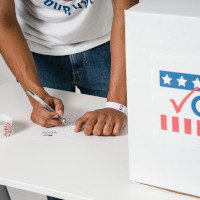
Green Voter Energy
View the page for this story
A recent poll of 2,600 voters climate concerned young voters in five battleground states conducted by The Environmental Voter Project and Beacon Research found they favored Democratic Presidential candidate Kamala Harris. Nathaniel Stinnett the founder and executive of the Environmental Voter Project joined hosts Aynsley O’Neill and Steve Curwood to discuss the possible impact of Harris’ favorability amongst young green voters. (15:16)

Kamala Harris on Climate and the Environment
/ Marianne LavelleView the page for this story
Democratic presidential nominee Kamala Harris she has a long environmental history from her time as a former California attorney general who took on oil companies, her work on the Inflation Reduction Act as Vice President, to her engagement in international climate diplomacy. Marianne Lavelle from Inside Climate News joins hosts O’Neill and Steve Curwood to walk through Kamala Harris’ environmental record and what it could mean for her campaign. (11:56)
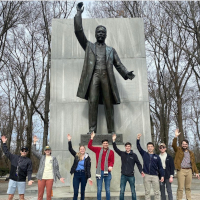
Young Conservative Climate Voters
/ Aynsley O'NeillView the page for this story
Climate change has been a polarizing issue between Republicans and Democrats but there is a growing young conservative movement that's calling for action. American Conservation Coalition Action calls for increasing nuclear power, streamlining energy permitting processes, and prioritizing U.S. energy dominance. Chris Barnard, President of American Conservation Coalition Action, joined hosts Aynsley O’Neill and Steve Curwood to discuss ACC Action’s platform. (08:30)
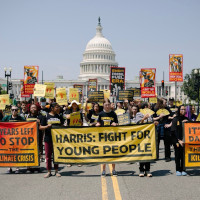
Sunrise Youth Want To Be Courted
View the page for this story
The 2020 elections were determined in part by young voters. Polling suggests President Biden lost support from that demographic throughout his term, so Democratic nominee Kamala Harris will need to attract them in her bid to keep the White House blue. The Sunrise Movement is among the multiple climate groups representing youth climate advocates that have yet to endorse a presidential candidate. Ariela Lara, a first-time voter and youth organizer for the Sunrise Movement, joined hosts Aynsley O’Neill and Steve Curwood to cover the organization’s demands on environmental policy. (10:11)
Show Credits and Funders
Show Transcript
240823 Transcript
HOSTS: Steve Curwood, Aynsley O’Neill
GUESTS: Ariela Lara, Nathaniel Stinnett
REPORTERS: Marianne Lavelle
[THEME]
CURWOOD: From PRX – this is Living On Earth.
[THEME]
CURWOOD: I’m Steve Curwood.
O’NEILL: And I’m Aynsley O’Neill.
As the fall elections kick into high gear, green advocates are pushing get out the vote campaigns.
STINNETT: We need to flood the electorate with climate voters. And until we do that politicians aren’t gonna lead on climate and you do that, not by appealing to what voters don’t care about, but rather by appealing to what they do care about.
CURWOOD: Also, climate activists explain why they are lining up behind Kamala Harris.
LARA: Harris has such an immense opportunity because to build on Biden’s climate achievements and moving forward key better act policies on climate, housing education that were left out of the inflation reduction act we know that Harris can really abide to a lot of the demands that we want her to meet.
CURWOOD: We’ll have that and more this week on Living on Earth. Stick Around!
[NEWSBREAK MUSIC: Boards Of Canada “Zoetrope” from “In A Beautiful Place Out In The Country” (Warp Records 2000)]
[THEME]
Green Voter Energy
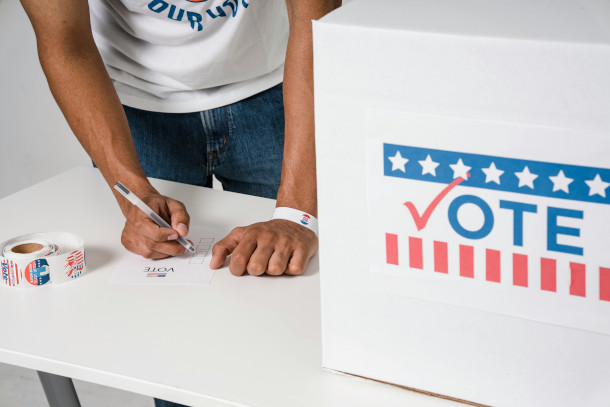
The 2024 elections are kicking into high gear, and youth voter turnout could make all the difference. (Photo: Sora Shimazaki, Pexels, CC)
O’NEILL: From PRX and the Jennifer and Ted Stanley Studios at the University of Massachusetts, Boston this is Living on Earth. I'm Aynsley O’Neill.
CURWOOD: And I’m Steve Curwood.
The race is off and running in this national election season, and green voters could make a huge difference. Joining us now is Nathaniel Stinnett from the Environmental Voter Project, for a look at some new data that’s come in. And wow, Nathaniel, what an interesting time to be talking about politics and polling, huh?
STINNETT: I know. I feel like 60 years worth of political news has happened just over the past six weeks, so I'm really excited for this conversation.
O'NEILL: So the Environmental Voter Project and Beacon Research, they just released poll findings indicating that Harris's nomination is quite popular among young voters in battleground states. How was that poll conducted, and did it specifically look at people who are likely to vote, or just young people in general?
STINNETT: So we polled over 2600 already registered voters, all of whom were young people. They were between the ages of 18 and 34, and they lived in battleground states. Now the way that we polled them was we used online panels, which is usually the best way to reach younger voters, and we polled at least 500 voters in each state so that we could get robust samples of both young likely voters and young unlikely voters in each of those states.
CURWOOD: So just how popular is Vice President Kamala Harris among young voters?
STINNETT: Kamala Harris literally has a higher favorability among young voters than Taylor Swift does, with Harris at 57% favorability and Swift at 51. Can you believe it? But they do different things well, so perhaps a more useful metric of Harris's popularity is not to compare her to Taylor Swift, but rather to look at what we call net favorability, which subtracts someone's unfavorable ratings from their favorable ratings, and this polling showed that Joe Biden is at negative 13 net favorability. Donald Trump is at negative nine, and Kamala Harris is at plus 16 net favorability. She's just trouncing Donald Trump and Joe Biden among younger voters.
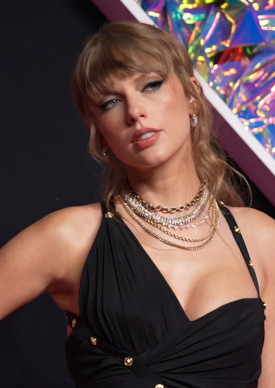
The Environmental Voter Project and Beacon Research teamed up to poll eligible young voters in battleground states. The poll found that Kamala Harris was more favorable than Taylor Swift. (Photo: iHeartRadioCA, Wikimedia Commons, CC BY 3.0)
O'NEILL: And so this was looking at battleground states. But what were those states? And to what extent can you tell whether or not this is reflected in other states as well?
STINNETT: So we ran this poll in five of the sort of seven battleground states that most people talk about: Arizona, Georgia, Nevada, North Carolina, and Pennsylvania. We did not include Michigan and Wisconsin. The reason we were just in those five states is those are the five states where the Environmental Voter Project works, and we were trying to do this as a public service, but also to inform our own voter turnout efforts. Now, as far as whether these numbers reflect what we might see among young voters in other states, well, to be honest, it's a little hard to tell. Part of the reason the Environmental Voter Project was conducting our poll was because there hadn't been much in depth polling of young voters on a state specific basis, but to the extent there is some polls out there, yes, we are seeing that Kamala Harris is doing consistently better with young voters than Joe Biden had been doing.
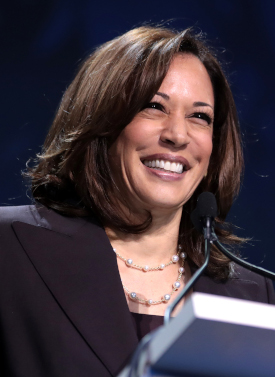
Polling indicates that Kamala Harris has a much higher favorability rating among young voters than current President Joe Biden. (Photo: Gage Skidmore, Wikimedia Commons, CC BY-SA 3.0)
CURWOOD: Now you've done some work in Florida in the past, not recently, not this particular round of polling. And we're wondering, to what extent might Florida be in play? I know that there's a referendum on reproductive rights there. Do you have any insights about polling data and or demographic data in places like Florida, maybe even Georgia, where you've identified environment centered voters? And I'm guessing, and this is a guess on my part, that environmentally focused voters would tend to fall more towards the looking for reproductive rights rather than restricting them.
STINNETT: That is a very, very good guess. Steve. You are absolutely right. Usually people who care deeply about preserving reproductive rights also care deeply about climate and environmental leadership. And you're also right that we do work in both Florida and Georgia, but we didn't poll particularly in Florida, but we do have some interesting insights, because when we polled in Arizona and Nevada, and just stay with me for a second. I know you weren't asking about those states, but they do offer some insights into Florida and Georgia. When we looked at Arizona and Nevada, we saw that both of those states have abortion rights ballot measures on their ballots this fall. And we saw in our polling in those two states that 31% of unlikely voters, so people who weren't intending to vote then reported that they were much more likely to vote after learning about these abortion ballot measures. And so I bring this up because it's a really useful data point for Florida, because Florida also has an abortion rights ballot measure on their ballot this fall, and we should certainly expect lots of young Floridians to come out and vote because of that. As for Georgia, they won't have a ballot measure this fall, but what we do know from this poll is that 25% of young Georgians say that protecting abortion rights is one of their top three priorities, and that might be enough to bring enough non voters off the sidelines in a really close state like Georgia, where abortion will be a campaign issue, even if it's not a ballot measure.
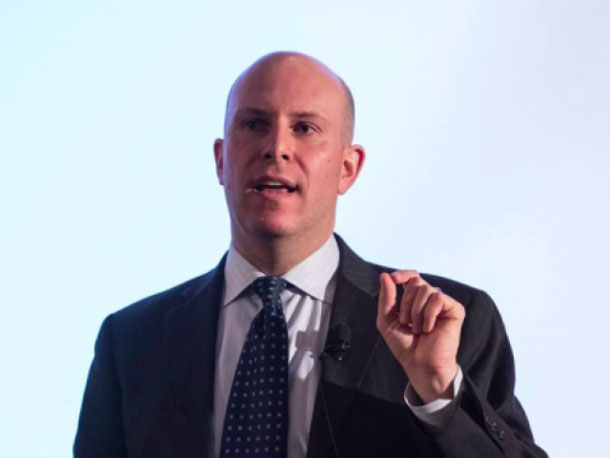
Nathaniel Stinnett is the executive director of the Environmental Voter Project, an organization that mobilizes potential voters whose main voting priority is the climate and environment. (Photo: Courtesy of Nathaniel Stinnett)
O'NEILL: I want to talk for a second about the point differential that we saw in that net favorability. So we have current President Joe Biden at negative 13, but his vice president now the Democratic nominee, Kamala Harris, plus 16. What is it about Harris that is more appealing to young voters in comparison to Biden?
STINNETT: Polls are better at figuring out what's happening than they are at figuring out why it's happening, but it does seem like it had grown impossible for President Biden to break out of the discussion about his age. There was nothing he could do or say to stop people from thinking about whether he was just too old to be president and so very simply, I think what's happening here is that Kamala Harris was able to launch a campaign and introduce herself to many people on her own terms, which Joe Biden was no longer able to do, and that's a huge advantage. And what young people are seeing so far is that she's a talented communicator for many of the values that Joe Biden tried to talk about, but nobody was listening because they kept on thinking about his age.
CURWOOD: Yeah. So Nathaniel, talk to us about what impact, if any, the pick for vice president that Kamala Harris made the coach, Tim Walz.
STINNETT: The coach!
CURWOOD: The coach! What impact did that have on young voters, doo you think?
STINNETT: Although it's hard to get precise data on this, one thing is really clear about Harris's pick of Walz as her running mate. Harris and Walz both come across as happy, genuine people, and because they both have those characteristics, they amplify each other, and they come to the foreground. And it's a real breath of fresh air to many young voters who had gotten pretty tired of slick, overproduced, often disingenuous politicians, and they really see Harris and Walz as just being real.
O'NEILL: Well, and a big issue for young voters is often turnout. You know, young people are not exactly known for high voter turnout. How important in this presidential election, 2024, how important is the youth vote going to be?
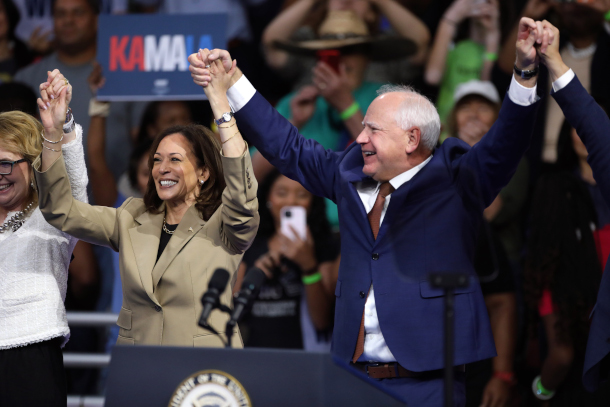
Nathaniel Stinnett believes that Harris’ and Walz’s happy, genuine personalities are refreshing to young voters. (Photo: Gage Skidmore, Flickr, CC BY-SA 2.0)
STINNETT: Well, I don't know how important it's going to be, but I sure know how important it could be. So young people are important, because 18 to 34, year olds make up almost a third of the country's eligible voters. But you're right to ask about turnout, because elections are decided by people who show up and vote, not by who's simply eligible to vote. And when we look at the data on turnout, this is what we see. In 2016 only 44% of 18 to 29 year olds voted, but then that shot up to 55% in 2020 so that was a big increase. But even then, it's nothing compared to the 72% turnout we see from people 65 and older. So the simple truth is that young voters could decide everything this fall, but it depends on whether they show up at 2016 levels, 2020 levels, or maybe even start voting as often as older voters do. There's a big range of outcomes and a lot of uncertainty, but there's no doubt that young voters could win or lose this election.
O’NEILL: We’re speaking with Nathaniel Stinnett of the Environmental Voter Project and we’ll be back in a moment to talk more about what states might be in play if environmentally concerned voters show up at the polls. Stay tuned to Living on Earth!
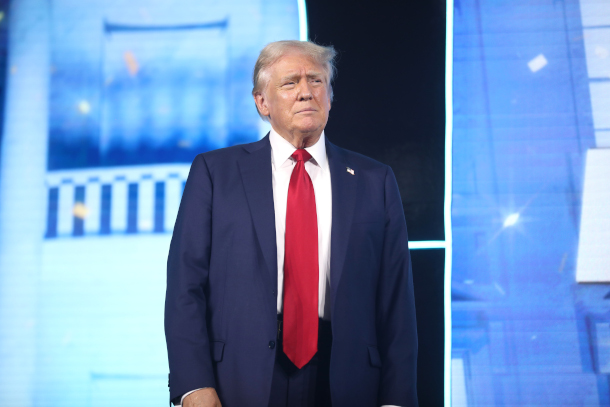
Though former President Donald Trump has a higher net favorability among young voters than President Joe Biden, his rating is 25 points lower than Vice President Kamala Harris. (Photo: Gage Skidmore, Flickr, CC BY-SA 2.0)
[MUSIC: Taylor Swift, “All To Well” (Taylor’s Version)” on Red (Taylor’s Version), Taylor Swift]
ANNOUNCER: Support for Living on Earth comes from Sailors for the Sea and Oceana. Helping boaters race clean, sail green and protect the seas they love. More information @sailorsforthesea.org.
[CUTAWAY MUSIC: Gene Ammons, “Someone to Watch over Me - Instrumental” on The Gene Ammons Story: Gentle Jug, Fantasy Inc.]
O’NEILL: It’s Living on Earth, I’m Aynsley O’Neill.
CURWOOD: And I’m Steve Curwood.
We’re back now with Nathaniel Stinnett from the Environmental Voter Project.
Nathaniel, in recent days, we've seen other pollsters, aside from yourself, see some shifts in previous dynamics. Joe Biden had the relatively narrow path to reelection, but now some of these pollsters are saying, well, you know, there are other states that might be in play. What do you think are the states to watch when it comes to the environmental vote in this election?
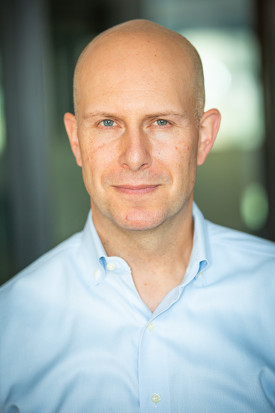
The Environmental Voter Project aims to mobilize unlikely environment-first voters, including young voters. They’ve found that door-to-door interactions and online ads are more effective at engaging young people than phone calls. (Photo: Courtesy of Nathaniel Stinnett)
STINNETT: There are four that really stick out, Arizona, Nevada, Georgia and Pennsylvania. So first, let me talk about the first three states, Arizona, Nevada and Georgia. These are all crucially important up and down the ballot, because they have a huge number of low propensity environmental voters, and if they show up, they could change everything. I mean, each of those states were decided by minuscule margins just four years ago. All right now, let me get to the fourth big enchilada state, Pennsylvania. In Pennsylvania, the Environmental Voter Project has identified 245,000 low propensity environmental voters, and Pennsylvania was decided by only 80,000 votes in 2020. And so simply put, it's going to be really hard for someone to win the White House this fall if they lose Pennsylvania, and those 245,000 potential brand new climate voters could easily make all the difference. So those are the four states that environmentalists should be watching on election night.
O'NEILL: And now, all right, we've talked about a couple of these key battleground states, but what are a couple of others that might be in play in addition to Arizona, Georgia, Nevada, Pennsylvania.
STINNETT: So it is clear that in addition to those states, three other places will be crucially important on election night, Wisconsin, Michigan and Nebraska's second congressional district. Now I think most people know how important Wisconsin and Michigan will be, but the Nebraska second is worth focusing on because it carries its own electoral college vote, and it's one of the closest districts in the country. Now, Biden won it by six points in 2020, but it's since been redrawn and is a few points more Republican leaning than before. I'm sorry to report to everybody that there are some nightmare scenarios where that one single electoral college vote in the Nebraska second could throw the whole country into a tied Electoral College, which, dear God, nobody wants. So watch the Omaha area on election night, because that one district's going to be really important.
O'NEILL: Environmental Voter Project's whole intent is mobilizing environment first voters, and I think with a particular interest in young voters. So what does that mobilization look like?
STINNETT: So the Environmental Voter Project is targeting 4.8 million climate first voters this fall, all of whom are already registered, but they're also unlikely to vote based on their previous voting history, and yes, many of them are young, close to 80% of them are under the age of 35. We'll be mobilizing them by phone calls, postcards, direct mail, door to door canvassing, and digital ads. And those last two methods, digital ads and door knocking are the most effective with younger voters, because they're not going to read their mail or answer a phone call from a number they don't recognize. So it's really important that we reach them online or face to face, and we're working with over 7,000 volunteers now to reach these very young, 4.8 million low propensity voters, and we're going nonstop through election day to get them to the polls.
CURWOOD: So at the end of the day, this is your business, environmental voters, and you have a project. But in the bigger scope of things, how important is it the work that you're doing and the electoral response of environmental voters?
STINNETT: No matter whom we elect, they are not going to lead on climate unless there is voter demand for them to lead on climate. You know, we spend so much time in election season thinking, "Oh, if only that person wins, then everything will be right," or "Oh my gosh, if that person wins, everything's going to be awful." And I don't want to claim that elections are unimportant. Obviously they are very important, and who wins is very important. But I think it's also important to know that just because the so called right candidate wins, they can't then just snap their fingers and get everything they want done, they still need to pick and choose what to spend their political capital on, and they ain't going to spend it on something that very few voters care about. So you ask about why the environmental voter projects work is so important. It's so important because we need to flood the electorate with climate voters. And until we do that, politicians aren't going to lead on climate not because they're bad people, but because the whole job of a politician is to win elections, and you do that not by appealing to what voters don't care about, but rather by appealing to what they do care about. So it has never been more important to get climate voters to the polls than it is this fall, and we're really, really excited about all the work that we're going to be doing over the next few months.
O'NEILL: We've been speaking with Nathaniel Stinnett, the founder and executive director of the Environmental Voter Project. Nathaniel, as always, thank you so much for joining us.
STINNETT: Thank you both for having me.
Related links:
- Read the full polling report.
- Learn more about the Environmental Voter Project’s work.
- Explore Harris’ presidential campaign.
- Explore Trump’s presidential campaign.
- Learn how to vote in every state
[MUSIC: Future, Tems, Drake, “WAIT FOR YOU (feat. Drake & Tems) – Instrumental” Single, Epic Records]
Kamala Harris on Climate and the Environment
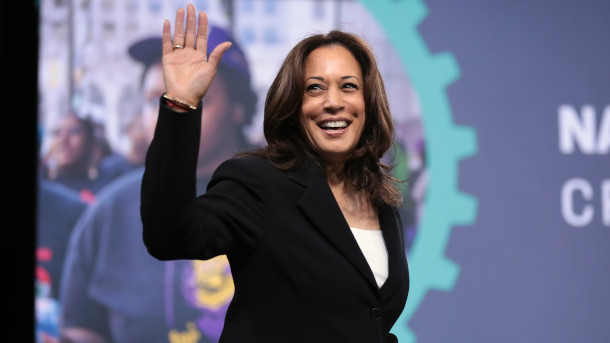
Kamala Harris’s record as an Attorney General who took on oil companies and promoted environmental justice has energized many climate voters. (Photo: Prachatai, Flickr, CC BY-NC-ND 2.0)
CURWOOD: During the recent Democratic National Convention there was scant mention of the climate and environment from the top of the ticket: Most of the messaging was about rallying the troops and getting to the polls, and little said about what the Democrats would do if they do keep the White House.
So Aynsley, let’s take a look now at the environmental plans of the Democratic nominee for president Kamala Harris. For help with that, reporter Marianne Lavelle of our media partner InsideClimate News she’s on the line with us now.
O’NEILL: Hi Marianne, welcome back to Living on Earth!
LAVELLE: Thank you, great to be here!
CURWOOD: So, this election season can we say it was shaken up when President Biden dropped out of the race and passed the torch to, Kamala Harris. What have you been hearing so far about Kamala’s candidacy from those who care about the climate?
LAVELLE: Well, it’s fair to say that this election has invigorated the climate movement, with some groups that have never-before endorsed a presidential candidate now declaring support for Harris. They point to her history as a former California attorney general who took on oil companies, the environmental justice work she has focused on in the Biden administration and also just historic nature of her candidacy as a woman of color. I talked to Kaniela Ing director of the Green New Deal Network, they recently endorsed Harris:
ING: We see this as a new opportunity, where if you look at Kamala Harris, she actually endorsed the green New Deal in 2020, has been a longtime champion for environmental justice, something that's deeply personal, to me, making sure that black and brown and low income communities aren't disproportionately impacted by corporate pollution. And we see the hope of presidency as something really refreshing. And so we're jumping in the race, something that folks didn't necessarily expect from a coalition like ours.
LAVELLE: I also spoke with R.L. Miller from Climate Hawks Vote. Again, that’s an advocacy group which has historically never endorsed a presidential candidate but this year they’re supporting the Harris ticket. This is what she had to say.
MILLER: And partly because of this extraordinary moment in which we find ourselves, you know, democracy is on the line. And she is trying to do in 100 days what normally is done in two years, and so it's very much an all hands-on deck moment.
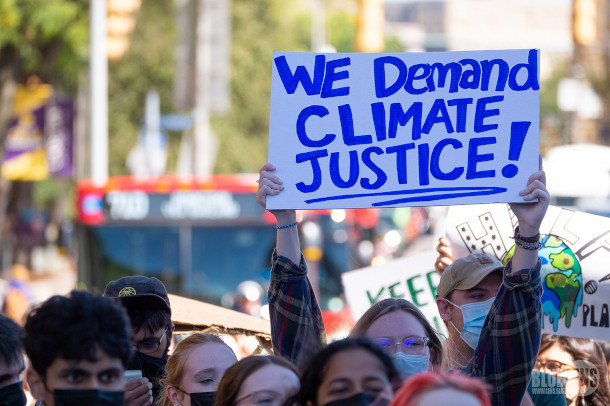
Two climate advocacy groups, the Green New Deal Network and Climate Hawks Vote, have endorsed Harris. They have never before endorsed a presidential candidate. (Photo: Wikimedia Commons, CC BY-2.0)
O’NEILL: All hands on deck! It sounds like the Harris campaign is really sparking a new energy in this advocacy world.
CURWOOD: Yeah, sure sounds like that. Marianne, let’s talk a bit about policy. I mean the Inflation Reduction Act has been touted as the biggest spending package on climate and energy. How is that being brought forward from the Biden-Harris administration into the Harris campaign?
LAVELLE: You know it’s interesting. A recent poll by the Center for Public Affairs Research says that 71 percent of U.S. adults either believe the IRA has not made much difference on climate change or they just don’t know enough to say. Now it’s not clear whether that’s because the Biden administration has failed to get the word out, or the fact that many of its benefits have yet to be felt. So now Harris has the big job of trying to explain the law, and how it is helping us meet climate goals as well as helping the economy.
CURWOOD: Yeah I don’t think that’s no easy feat.
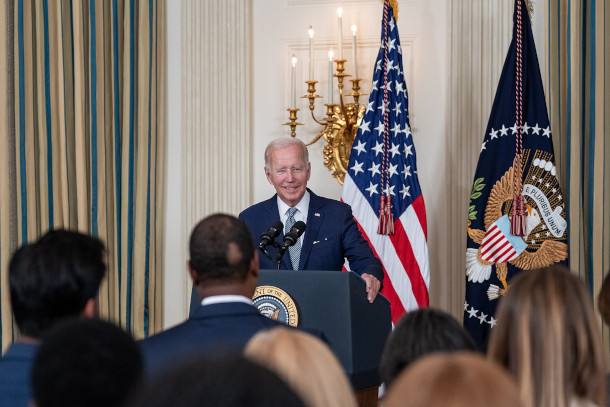
According to a recent poll from the Center for Public Affairs Research, 71% of U.S. adults either believe the IRA has not made much difference on climate change or they just don’t know enough to say. (Photo: Executive Office of the President of the United States, Wikimedia Commons, public domain)
O’NEILL: Yes and that was a big climate win for the Biden administration, so what examples if any are there of Harris trying to spread the word on the Inflation Reduction Act?
LAVELLE: Well, here’s an example. You know the idea of a “Green Bank” it has been talked about since Obama was in office. It's a financial institution that would lend public money to help cash-strapped businesses and individuals invest in things like solar panels and energy-efficiency. The Green Bank idea was actually brought to life through the Inflation Reduction Act. About $20 billion dollars are being distributed through these community-based lenders. Kamala Harris traveled to North Carolina in April to announce the recipients. She got to meet first-hand some of the people who will benefit from the fund, like Levon McBride. He's a small business owner who lives in a super energy-efficient home financed by the Self Help credit union in a historic African American community called Grier Heights. He told the vice president his energy bills have dropped dramatically, from about $600 a month to $100 a month. I talked to him about the Vice President’s visit.
MCBRIDE: I just felt like one she really, really truly cared about long term environmental impacts for not just we as adults now, but for our children as well because we did, you know, mention that like the legacy we wanna leave behind for our kids. We wanna leave an earth for them. We wanna be able to have clean air and things for them. But also she really cared for normal families, you know just everyday people like myself.
O’NEILL: Okay, so it does sound like she’s getting the word out here at home. But let’s go global what’s been her role in international climate policy?
LAVELLE: Kamala Harris represented the United States at the recent climate talks in Dubai. She also led the U.S.-Caribbean clean energy engagement effort, and has promoted bilateral cooperation in travels to Asia and Africa. But this kind of diplomacy has not been cast in a good light by former president Trump or the environmental officials who worked under his administration. I talked with Mandy Gunasekara, the former chief of staff for the EPA and one of the authors of Project 2025. That's the Heritage Foundation-sponsored policy roadmap we have all heard about for a second Trump administration. She said that carbon emissions have increased since the start of the international climate negotiations.
GUNASEKARA: the overarching goal is to reduce global emissions. And since the start of this emissions have only gone up, imagine if we had spent the resources and the international political capital actually sharing innovative ideas, in terms of harnessing energy, and then using it efficiently, what sort of changes we could have ultimately had globally, or we could have helped cultivate globally. But instead, it's been this bureaucratic UN process, where again, you get caught in this do loop of talking about things but not producing a lot of tangible results, or measurable improvements.
LAVELLE: You know she's right that carbon emissions have continued to increase. But the UN Environment Program says it's important to realize the rate of increase has slowed significantly, and that's because of policies enacted since 2015’s Paris Climate Agreement.
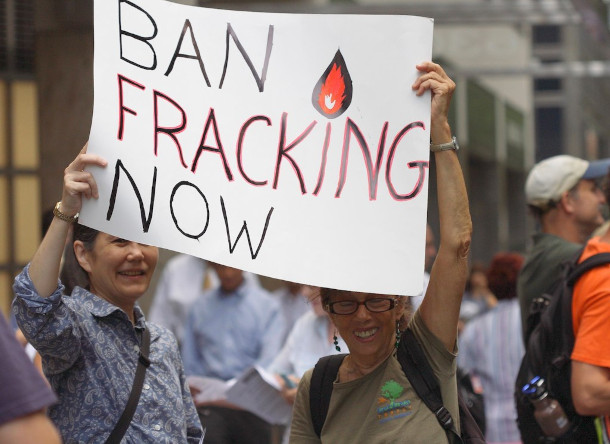
In 2020, Harris said she would ban fracking. She says she no longer favors a ban in her 2024 campaign. (Photo: Owen Crowley, Flickr, CC BY-NC-ND 2.0)
CURWOOD: And while we’re on the topic, where are we in terms of former president Obama’s original $3 billion pledge to help developing countries respond to climate change?
LAVELLE: The U.S. and other developed nations remain far short of the $100 billion per year they pledged to mobilize by 2020. Now Vice President Harris took up this issue on her trip to Africa last year. She did fundraising herself from private companies and foundations and was able to raise $7 billion for climate resilience, adaptation and mitigation in Africa. She announced this in Zambia at a farm that runs on 100 percent solar energy. The owner, Bruno Mweemba tries to run his farm as a model for how smallholder farmers in Zambia can operate more sustainably. Here’s what he had to say about Kamala Harris’ visit.
MWEEMBA: It was also a huge opportunity for me to really, you know, showcase to her what I would probably call the real world on the ground really looks like, because I know most of our world leaders spend quite a lot of time in a lot of, you know, air conditioned boardrooms. And I think it was such a pleasure for me to really, you know, pull her, you know, into the dirt roads, and then she comes to a real farming enterprise that really interfaces with the, you know, realities of some of these global social and economic issues.
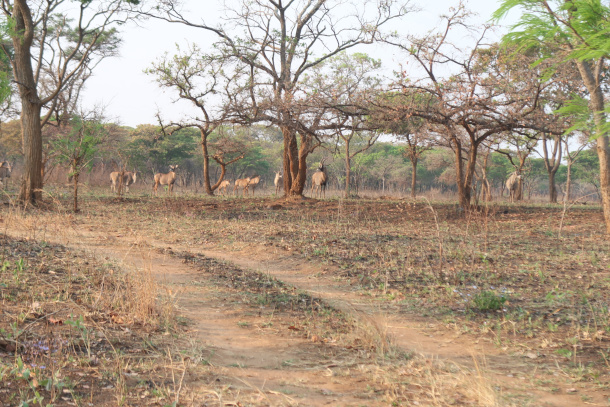
Zambia has experienced extreme drought exacerbated by climate change. Kamala Harris raised $7 Billion from private companies and foundations for climate resilience, adaptation, and mitigation in Africa. (Photo: Bengt Flemark, Flickr, CC BY-NC-ND 2.0)
LAVELLE: Zambia is one of six countries in southern Africa that have declared national emergencies due to severe drought that has destroyed crops and dried up hydroelectric power. Tens of thousands of children are at risk of malnutrition due to what UNICEF says is a climate-related crisis.
CURWOOD: Well that’s a big story we’re going to, have to follow up on the development of that down the road.
O’NEILL: Of course. Now, a major sticking point in past elections has been liquified natural gas.
CURWOOD: Yeah, and during her 2020 campaign Kamala said she would ban fracking. So far what has the Harris campaign said in terms of its fracking and LNG plans today?
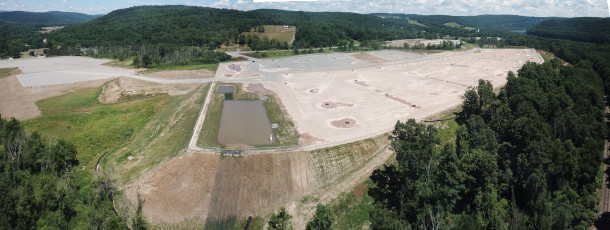
The Harris campaign has not been clear about where they stand on new LNG export terminals. (Photo: FrackTrackerAlliance, Flickr, CC BY-NC-ND 2.0)
LAVELLE: Yes, those are key energy issues for this year's election. On fracking, Harris' campaign has made clear that she no longer favors a ban. This is a particularly hot issue in Pennsylvania, which is not only a must-win state for Harris, it's a hotspot for fracking. On LNG, though, Harris has not said where she stands on new export terminals, which the gas industry wants very much but are strongly opposed by many frontline communities on the Gulf Coast. Biden announced a temporary pause on new LNG terminals early this year, but the gas industry is challenging this in court and it is a policy Trump has promised to lift. The fossil fuel industry liked to argue that Biden was just trying to win over young voters with his LNG pause. Young voters, of course, helped carry Biden to victory in 2020. But the interesting thing is that polls as recently as last spring showed that the LNG decision had not helped Biden with young voters, they were not happy with Biden's record on climate in general. But polls are now showing those same voters are very enthusiastic about Harris, even though we don't know yet whether her policies will be different from Biden's policies.
CURWOOD: Thanks Marianne!
O’NEILL: Thanks Steve and Aynsley.
CURWOOD: Marianne Lavelle is a reporter with inside Climate News our media partner.
Related links:
- Read more about the Green New Deal Network
- Read more about the Climate Hawks Vote
- Environmental Protection Agency | “Green Banks”
[MUSIC: Pro Sound Karaoke Band, “If I Fall You’re Going Down With Me [In The Style Of Dixie Chicks]” on Sing Alto – Country, v.17 (Karaoke Performance Tracks)]
CURWOOD: Coming up, two young environmental activists from either side of the aisle with their thoughts on the Harris campaign. Keep listening to Living on Earth.
ANNOUNCER: Support for Living on Earth comes from Friends of Smeagull the Seagull and Smeagull’s Guide to Wildlife. It’s all about the wildlife right next door to you! That’s Smeagull, S - M - E - A - G - U - L - L, SmeagullGuide.org.
[CUTAWAY MUSIC: Doc Watson, David Grisman, “Watson Blues” on Doc & Dawg, Acoustic Disc]
Young Conservative Climate Voters
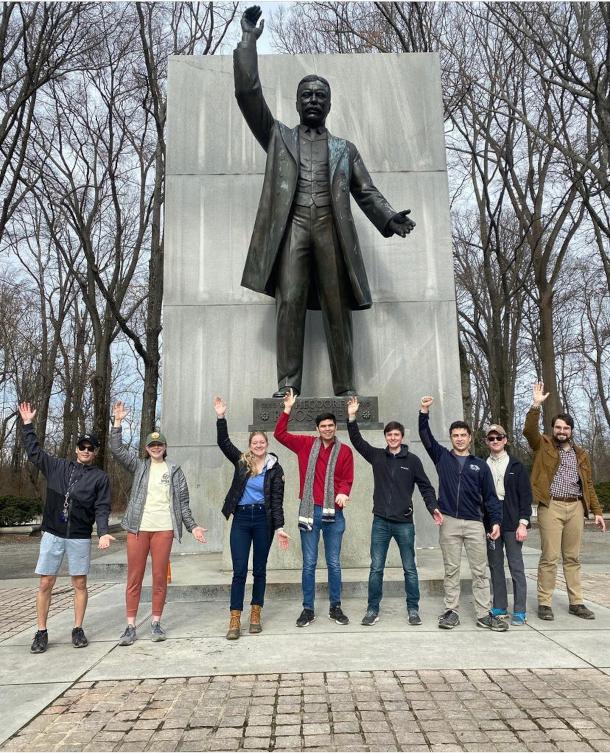
Members of American Conservation Coalition Action at Theodore Roosevelt Island, a national memorial located on the Potomac River in Washington, D.C. Theodore Roosevelt is often considered the "conservationist president". He studied natural history, enjoyed botany and believed nature existed to benefit mankind. (Photo: American Conservation Coalition Action)
CURWOOD: It’s Living on Earth, I’m Steve Curwood.
O’NEILL: And I’m Aynsley O’Neill.
So, Steve, we’ve mentioned that there are anti-environment Republicans who are using Kamala Harris’ environmental record and her campaign’s environmental plans against her. But there are also some pro-environment Republicans who are coming at the issue from a different angle.
CURWOOD: Of course, Aynsley, I mean, there’s a long history of Republican action on the environment, think Teddy Roosevelt. And while these issues have become polarized in recent decades, there’s nothing stopping conservative Americans from leading on climate or the environment.
O’NEILL: Exactly, and that’s the whole mission of the group American Conservation Coalition Action - bridge the perceived gap between Republican values and environmental action. I spoke with their president, Chris Barnard about exactly that ethos:
BARNARD: I think it’s really going back to first principles, like, if you think of the term conservative, you think of the term conservation, they’re really the same root word. It’s about wanting to protect and take care of the beautiful things around you, and then passing that on to future generations in a place better than when you found it. That’s the concept of stewardship, it’s the concept of personal responsibility, of taking care of your community, and thinking of future generations and past generations. I think honestly there’s nothing more conservative than conservation. It’s two sides of the same coin.
CURWOODL Words are one thing, what about actions? Where do they stand?
O’NEILL: I’m not going to lie, Steve, some of our listeners should get ready to clutch their sustainably-farmed pearls, because some of ACC Action’s positions are going to be a little controversial for many in the environmental movement. For example, they’re really supportive of nuclear as a clean energy source.
BARNARD: When it comes to climate specifically, I think one of the big issues that we're facing right now is, how can we have a growing economy, and how can we meet the increasing demand for electricity in a way that does not make climate change much worse. Our view at ACC action is that we need to have a lot more nuclear energy as part of that, because nuclear is, right now, the largest source of clean energy in the country that's also base load. But also we need to make it much easier in general, to just build energy infrastructure, whether it's transmission lines, whether it's battery storage facilities, whether it's solar farms or wind farms, or even pipelines for carbon being transported, for carbon capture and storage. I think right no, we don't have enough clean energy in the country and because of our regulatory system it's incredibly difficult to build nuclear energy projects. I think the reality is that we need to build more and we need to build faster and really it’s the government standing in the way of that.
O’NEILL: And as you can hear, ACC Action is also making a big push for overall permit reform - even if that includes fast-tracking fossil fuel projects as well as clean energy projects
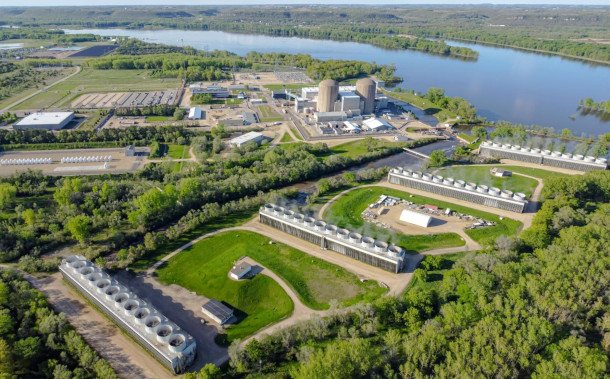
The Prairie Island Nuclear Generating Plant (pictured above) is an electricity-generating facility located in Minnesota, along the Mississippi River, next to the Prairie Island Indian Community reservation. American Conservation Coalition Action believes that nuclear energy should be a key part of the United States clean energy landscape. (Photo: Wikideas, Wikimedia Commons, CC0 1.0 Universal)
BARNARD: And so I think it's really important that both sides come together and say, Okay, everyone wants to build more energy. Some people want more, like pipelines and things like that some people want more clean energy. If we pass a permitting reform package that will overwhelmingly benefit clean energy, and that is the only way that we can build this stuff at a scale and a speed enough to compete with climate change, but also to compete with China and make sure that we dominate these supply chains going forward. Even with the IRA right now, which is the largest investment in US history, and clean energy, a lot of that money will go to waste if we can't actually build the projects that that money is intended to go to.
CURWOOD: So Aynsley, what’s this claim based on?
O’NEILL: Well, Chris Barnard cites this study out of Princeton’s ZERO Lab. It suggests that 80% of the Inflation Reduction Act’s potential emissions reductions could go to waste unless we double the rate of electricity transmission expansion that we had in the last decade. And ACC Action believes that permitting reform is the best way to speed that expansion up.
CURWOOD: Well, permitting only exists as it does now because it’s based on legacy fossil fuel utilities. And switching our grids will be a lot more tricky than simply cutting some regulations, especially when you take into account things like Texas running on its own separate grid. But what else did he have to say about the Inflation Reduction Act?
O’NEILL: Chris thinks it was a missed opportunity for Democrats to reach across the aisle:
BARNARD: I think this has been said many times before, so at the risk of flogging a dead horse here, the IRA was a purely partisan package. It kind of was designed that way, and actually excluded a lot of Republican voices that could have probably contributed to making it a stronger deal. And so I think we to be clear in saying that that's not how I believe we should be creating laws, especially things that are as consequential as on climate and clean energy.
CURWOOD: But, Aynsley, I think a lot of Republican districts have benefitted from the massive spending under the IRA, right?
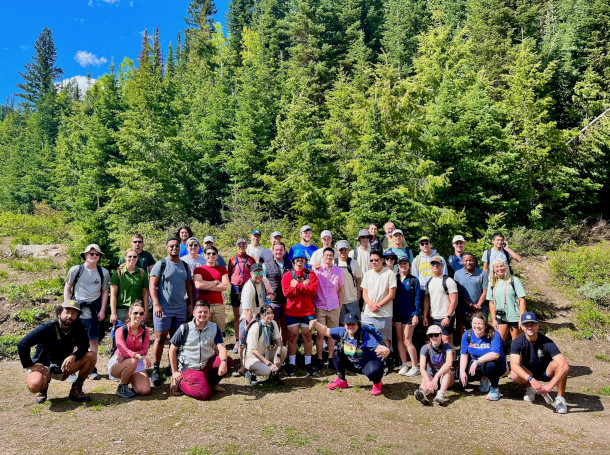
Members of the American Conservation Coalition Action during their 2023 Summit Hike. (Photo: American Conservation Coalition Action)
O’NEILL: Yeah, he did acknowledge that. It’s a bit ironic, in the end.
CURWOOD: But looking forward, the Democrats have now nominated Vice President Kamala Harris. What does this conservative conservation coalition group say about her environmental record?
O’NEILL: Well Chris said that for him, a red flag for Kamala is her co-sponsorship of the Green New Deal back in 2020, along with her past objection to fracking, something she has sort of walked back during this campaign:
BARNARD: Kamala Harris came out in the past. She's kind of flip flopped on this recently, but she said that she was opposed to fracking and would want to get rid of fracking in the United States. And again, I understand why someone who cares about climate would have that approach and would want to kind of get rid of like fossil fuel fracking. But again, it's one of those things where it's rooted in emotion and kind of ideology rather than rooted in reality. And you see that very clearly with the fact that the reason America has reduced emissions more than any other country in the world, more than the next eight countries combined, in the last 10 to 15 years, is because we've gone from coal to natural gas due to the fracking revolution.
CURWOOD: And of course, the only reason the U.S. has reduced emissions so greatly is because we had so many in the first place. When it comes to percentage of total national emissions, plenty of other countries have us beat. But what does he mean about our emissions reductions coming from a switch to natural gas?
O’NEILL: Now this is something that Chris told me - when natural gas is burned, it emits about half of the CO2 that coal does when it is burned.
CURWOOD: But that must not account for when natural gas, which is mainly methane, leaks into the atmosphere. So in that case, it’s much more potent than CO2 as a greenhouse gas.
O’NEILLL: Very true.
CURWOOD: So, there’s a lot of tension over natural gas. And on that and perhaps other measures, it seems like he and ACC Action are pushing for Kamala to take a more center position when it comes to energy.
O’NEILL: Yeah, Chris and definitely made a point to me that he thinks democrats and republicans need to find common ground on these issues.
BARNARD: So I really do think there are areas of bipartisan collaboration that don't necessarily make it through the rhetoric and all the things that we see in terms of the division, but there are things that we should be hopeful about. And really, at the end of the day, it's about, how can we make progress and not have perfection be the enemy of progress?
CURWOOD: Ah, so he seems to think realistic climate progress is going to require some trade-offs. And let’s face it, one of those might be burying the hatchet in terms of today’s deep partisan divide.
O’NEILL: Well, that’s for sure. And in the end, ACC Action wants to tell young conservative environmentalists that they have a place in politics - and older conservatives generally that they need to get on board:
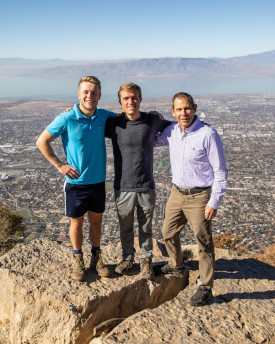
Chis Barnard (left), Benji Backer (center) and Representative John Curtis (R-UT3, right) hike in Utah during ACC’s Electric Election Roadtrip. (Photo: American Conservation Coalition Action)
BARNARD: Well, look, if you're under 35 it doesn't matter if you're a Republican or a Democrat, a liberal or conservative, you care about climate change, you care about environmental issues, and it really matters a lot to who you are, how you view the world, and to how you felt. There was a poll recently that found that 81% of young Republicans under the age of 35 believed in climate change, thought it was a big issue and wanted to do something about it. So clearly, the overwhelming majority. And I think that's really what this is about. Young people care about this. They are demanding some kind of action. They are increasingly voting on this. It routinely ranks as a top three issue in how they vote, and that trend is going to dictate elections. It's going to dictate politics. It's going to dictate political affiliation for young people. And our message at ACC action to older Republicans is, look, this matters a lot to our generation, and if you want to make sure that you stay politically relevant to an entire generation of young people, you need to start talking about it productively and take a seat at the table.
O’NEILLL: That’s Chris Barnard, president of American Conservation Coalition Action.
CURWOOD: And Aynsley, he’s got it right that everyone is going to need to pitch in if we’re going to be able to survive the climate emergency.
O’NEILL: Yep, this is one issue that doesn’t care what party you’re in.
Related links:
- Learn more about the American Conservation Coalition Action
- Forbes | “Why the U.S. Leads The World In Reducing Carbon Emissions”
- Energy Institute | “Statistical Review of World Energy”
- Learn more about Princeton’s Repeat Group study about Electricity Transmission and the IRA
- CRES | “Republicans and Independents Support Action to Promote Clean Energy and Combat Climate”
[MUSIC: Elisapie Isaac, “Navvaatara” on Native America, by Elisapie Isaac, Putumayo World Music]
O’NEILL: The outcome of the 2024 US presidential election could profoundly shape the future of the climate and environment both at home and around the globe. And there are important down-ballot races and ballot measures too. Here at Living on Earth we are working hard to give you the stories and information you need to make your decisions on election day. So, what issues are you most interested in having us cover? Let us know by sending us a written or audio message at comments@loe.org. You can use the Voice Memos app on the iPhone, the Voice Recorder app on an Android device, or any similar app to record your message and then email it. And, we might just include your voice on air! Just be sure to give us a daytime phone number to reach you so we can verify your submission. So, email us, at comments@loe.org!
[MUSIC: Elisapie Isaac, “Navvaatara” on Native America, by Elisapie Isaac, Putumayo World Music]
Sunrise Youth Want To Be Courted
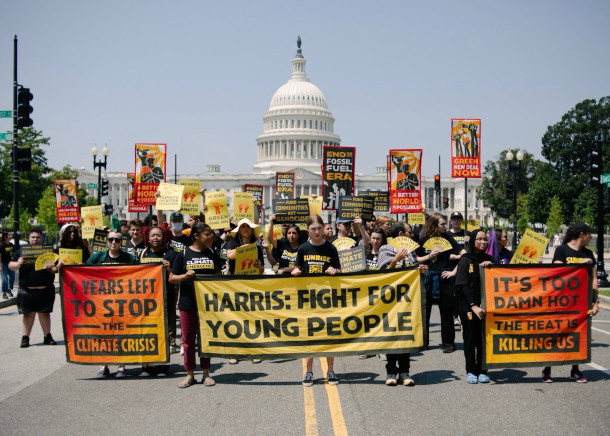
The sunrise movement protesting for a declaration on the climate emergency at the 2024 Democratic National Convention in Chicago. (Photo: Rachel Warriner, Sunrise Movement)
CURWOOD: Although youth voter turnout determined the 2020 elections, polling suggested President Biden lost that group as his term went on. But with the excitement about her nomination, Kamala Harris has the opportunity to attract that voter base, as we heard earlier in the broadcast. So, Aynsley you talked to an organizer in the Sunrise Movement, which is among the multiple climate groups representing youth climate demands.
O’NEILL: Yes, Steve, Sunrise was founded in 2017 with the goal of redefining climate politics in the United States. They’re in the Green New Deal Network which has endorsed Kamala Harris, but the Sunrise Movement itself follows a different process and has yet to endorse a candidate. So, I spoke with Ariela Lara, who joined Sunrise a few years back, and has been organizing with them ever since. She’s a first generation Latina who’s seen the impacts of environmental injustice first hand both in Oaxaca and in California’s Bay Area. As an 18 year old this year will be her first time casting a presidential vote, and she joins us now. Ariela welcome to Living on Earth!
LARA: Hi, thank you so much for having me.
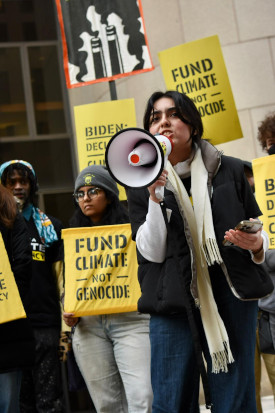
Ariela Lara worked as one of the leaders of Somos Sunrise, a national constituent network of Latines within the Sunrise Movement that aims to recruit and train other Latines to become leaders in their communities and take nonviolent action to stop the climate crisis. (Photo: Courtesy of Ariela Lara)
O'NEILL: So the Sunrise Movement has yet to endorse a presidential candidate in this election. What sort of actions are you calling on presidential candidates to prioritize when it comes to environmental policy and climate justice?
LARA: Yes, right now we realize that we have only six years left to take really bold climate action. This summer, it was the hottest summer we've seen. There was Hurricane Barrel and there was climate disaster one after the other. Our homes are flooding and wildfires are tearing through our communities, and it's getting worse, and we know that Vice President Kamala Harris needs to step up and that taking action is a key part of her campaign. And so young people have been clear about what we want from our president. We called for Biden to step down, and called on Harris to choose a VP who would fight for us, and we won those demands. The reality is that there is a lot of Democrats that still have not done enough, and we know that there needs to be a permanent ceasefire in Gaza and transformative investments in our future. And Kamala has listened to our movement before, and our movement is strong. And this election, we're making sure our voices are louder than ever, and we know that our wins are foreseeable in the future.
O'NEILL: Now there's this campaign by Sunrise, which is calling on the Biden administration to declare a climate emergency. What would an official declaration of a climate emergency mean for policy and federal action?
LARA: There's so much. I could speak about this for a long time but one of the first things is holding fossil fuel companies accountable by ending subsidies and appointing an attorney general who investigate oil and gas companies. And we know that Kamala needs to end handouts from oil and gas companies and stop the boom in fracking. Second, rapidly build a renewable powered and more affordable energy system through building retrofit programs, expanding initiatives like solar for all, and expanding wind and solar create green jobs by expanding the American Climate Corps initiative that was organized by the Sunrise Movement and eventually won and passed in The Biden administration, and investing in renewable energy development. We know that we can invest in healthy, sustainable communities by funding Green Public Schools, protecting our health, supporting low carbon industries like healthcare and investing in green affordable housing, clean air and water. And these aren't just ideals, but there are basic living necessities. And just thinking about US policy overall, Congress has given the president wide reaching powers in the event of emergencies. We call this a climate emergency, because in World War II, FDR used these powers to ramp up US manufacturing Biden used their emergency powers to make covid vaccines free and widely available. But Biden right now could reverse the massive rise in fossil fuel production he has approved.
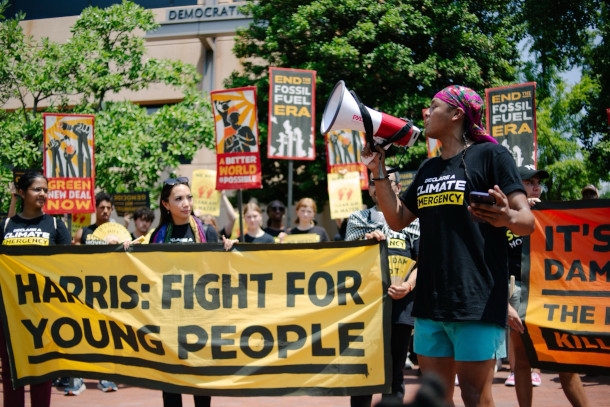
Sunrise Movement is amongst the climate groups that has yet to endorse Democratic Presidential candidate Kamala Harris. They commended Harris' 2020 campaign for her support for a Green New Deal and banning fracking, but those promises are not part of her 2024 campaign. (Photo: Courtest of the Sunrise Movement)
O'NEILL: Now the Sunrise Movement is also calling for a ceasefire in Gaza. What do you see as the link between that and the environmental crisis?
LARA: Right. So we know that there is a lot of money that goes into military within our country, with $14.1 billion, Congress is considering spending on weapons for Israel. And 280,000 tons of carbon dioxide were emitted by the Israeli military on the first 60 days of its attack on Gaza. And situated amongst the 196 countries ranked by greenhouse gas emissions in 2018 the US Military Industrial Complex came in the 25th highest polluting more than 171 countries, which says a lot about our spending on the military overall. And this is an industrial consumer of oil and gas as well, and one of the largest polluters in the history of the world. And so this is a clear indicator of just the amount of money and investment that has gone to our military and how our taxpayer dollars go toward a genocide, and innocent lives are lost, and our money is not going to our communities for the rapid responses that we could be doing to guarantee everyone free healthcare and safe housing that they need after climate disaster strike, and it's such a horrific reality.
O'NEILL: So as a Sunrise community organizer, what sort of political strategy is going on here when it comes to Sunrise, mobilizing voters, but not endorsing a candidate?
LARA: Right now, we are focused on what is going to mobilize young people to the polls and voters to the polls. And what we're seeing is that we know that what we're doing is bigger than an endorsement, and sunrise is in a unique position to be able to reach people who feel that politics has not worked for them. Or have identified policies in the Biden administration that they believe need to change. And so we believe right now that the most effective way to mobilize young voters is to have conversations where they are heard and bring them into the movement. And we will have thousands of voters contacting thousands of young people across the country, and I will be one of those thousands of young volunteers. We plan to share why we believe it is so critical to be out in the polls voting for a candidate that is movable, instead of a candidate that wants to reverse so many climate policies, reverse Immigration Reform and project 2025 is that scary reality that Trump will be doing in his first 100 days in office. We know that Harris is someone that can really step up to the plate for us as young people this November. Harris has such an immense opportunity, because to build on the narrative in the coming weeks with a vision for building on Biden's climate achievements and moving forward, key build better act policies on climate, health care, housing, education that were left out of the inflation Reduction Act, the biggest investment in clean energy, we know that Harris can really abide to a lot of the demands that we want her to meet. And in 2020 climate voters were key to delivering Democrats the election, and a lot of politicians in office are not in the position that they're in without our vote. So if Harris runs on climate, that's what we'll do once again.
Democrats barely mentioned climate change on the first day of the DNC.
— Sunrise Movement ???? (@sunrisemvmt) August 20, 2024
This week, @KamalaHarris has a choice to make: will she let Big Oil and their bought-out MAGA politicians bully her into sidelining the issue?
O'NEILL: Ariela, this year, you are a first time voter. How do you feel heading into this election?

Ariela Lara is community organizer for Sunrise Movement. (Photo courtesy of Ariela Lara)
LARA: Yeah, 18 is something that I've been waiting for, for a very long time. I feel like most of my student High School organizing and just even like in middle school, witnessing the Trump inauguration. And I remember tears rolling down my face that same year because I remember what that meant for my family when they didn't have papers. And what it would look like in a Trump presidency where he's getting so much money from Big Oil, is not going to listen to the people that voted for him, is not going to represent or help any of the communities that are most vulnerable, but instead is going to do that complete opposite. And at a young age remembering those tears, remembering the fear that I felt during that time, really sticks with me because it really drove a lot of the engagement I was doing throughout the years to ensure that we were having politicians in office that were committing to ensure that like communities are going to have public resources and Green New Deal champions that are going to ensure an equitable green economy and in support of all of that. And now I've come to 18 where I can finally cast my vote, which means a lot to me. Harris has a really big opportunity to listen to what the voices of young people are demanding from her, and I think that with just what the Biden administration has passed before, with the inflation Reduction Act, the American Climate Corps, those were only possible because of the hundreds and thousands of young people that were out on the streets and demanding green good, union jobs, that were demanding investments in clean renewable energy, and we're going to continue going out in the streets fighting for what we deserve. And I'm excited for Kamala to really step up to the plate.
O'NEILL: Ariela Lara is a community organizer for the Sunrise Movement. Thank you so much for taking the time with us today.
LARA: Thank you so much for having me.
Related links:
- Learn more about the Sunrise Movement and their Climate Emergency Campaign
- Read the Sunrise Movement’s Letter to the Harris Campaign
- The Guardian | “Emissions from Israel’s War in Gaza Have ‘Immense’ Effect on Climate Catastrophe”
- Read the study on greenhouse gas emissions from the Israel-Gaza Conflict
- Read analysis on the US military-industrial complex’s carbon pollution
- CNN | “Children Are Drinking From Puddles and Wading Through Sewage Pools, as Israel Pummels Water Systems in Gaza”
- MotherJones | “The Sunrise Movement Thinks Climate Is the Key to Voters’ Trust”
[MUSIC: Larry Carlton, “Morning Magic” on Depp Into It, Warner Records Inc.]
CURWOOD: Living on Earth is produced by the World Media Foundation. Our crew includes Naomi Arenberg, Shanzay Asif, Paloma Beltran, Kayla Bradley, Josh Croom, Jenni Doering, Karen Elterman, Daniela Faria, Swayam Gagneja, Sommer Heyman, Mark Kausch, Mark Seth Lender, Don Lyman, Nana Mohammed, Sophia Pandelidis, Jake Rego, Andrew Skerritt, El Wilson, and Jolanda Omari.
O’NEILL: Tom Tiger engineered our show. Allison Lirish Dean composed our themes. You can hear us anytime at L-O-E dot org, Apple Podcasts and YouTube Music, and like us, please, on our Facebook page - Living on Earth. We tweet from @livingonearth. And find us on Instagram at livingonearthradio. And you can write to us at comments at loe dot org. I’m Aynsley O’Neill.
CURWOOD: And I’m Steve Curwood. Thanks for listening!
ANNOUNCER: Funding for Living on Earth comes from you, our listeners, and from the University of Massachusetts, Boston, in association with its School for the Environment, developing the next generation of environmental leaders. And from the Grantham Foundation for the protection of the environment, supporting strategic communications and collaboration in solving the world’s most pressing environmental problems.
ANNOUNCER 2: PRX.
Living on Earth wants to hear from you!
Living on Earth
62 Calef Highway, Suite 212
Lee, NH 03861
Telephone: 617-287-4121
E-mail: comments@loe.org
Newsletter [Click here]
Donate to Living on Earth!
Living on Earth is an independent media program and relies entirely on contributions from listeners and institutions supporting public service. Please donate now to preserve an independent environmental voice.
NewsletterLiving on Earth offers a weekly delivery of the show's rundown to your mailbox. Sign up for our newsletter today!
 Sailors For The Sea: Be the change you want to sea.
Sailors For The Sea: Be the change you want to sea.
 The Grantham Foundation for the Protection of the Environment: Committed to protecting and improving the health of the global environment.
The Grantham Foundation for the Protection of the Environment: Committed to protecting and improving the health of the global environment.
 Contribute to Living on Earth and receive, as our gift to you, an archival print of one of Mark Seth Lender's extraordinary wildlife photographs. Follow the link to see Mark's current collection of photographs.
Contribute to Living on Earth and receive, as our gift to you, an archival print of one of Mark Seth Lender's extraordinary wildlife photographs. Follow the link to see Mark's current collection of photographs.
 Buy a signed copy of Mark Seth Lender's book Smeagull the Seagull & support Living on Earth
Buy a signed copy of Mark Seth Lender's book Smeagull the Seagull & support Living on Earth

